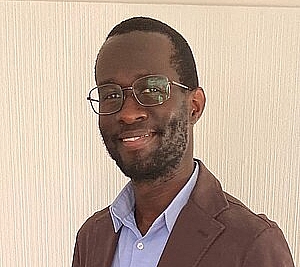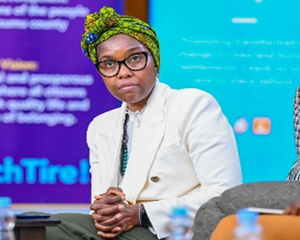Webinar Dialogue: Just City in Concrete - Centering People in Africa's Urban Future

We marked the World Cities Day on 31 October 2025 under the global theme of “People-Centered Smart Cities.” The POA Just City initiative invites you to reimagine what a truly inclusive urban future could look like, one where justice is not an afterthought, but the foundation.
Smart Cities, But for Whom?
Digital technologies are transforming urban life rapidly. Cities embrace innovation for better services and solutions, but questions of who benefits remain. The smart city focuses on efficiency and connectivity, yet can mask inequality and exclusion. A just city prioritizes participation, equity, and dignity, ensuring digital progress uplifts the vulnerable.
In response to these urgent questions, the Just City Project of the Friedrich-Ebert-Stiftung (FES) in Africa is hosting an online event that brings together voices from across the continent to discuss bottom-up approaches to urbanization that are based on justice, inclusion, and sustainability.
Featuring thought leaders: Steve Akoth, Dr. Jeremy Okonjo, Emmanuel Njavike and Kenya’s UN-Habitat Director Beryl Khanyile, the event will spotlight real-world examples from African cities where grassroots movements, youth-led planning, and policy innovation are reshaping urban futures. From informal settlements to digital governance, these voices will explore how justice can be embedded in concrete—literally and metaphorically.
Just City in Concrete: Centering People in Africa’s Urban Future
Date: Wednesday, 26th November 2025
Time: 2:30 PM – 4:15 PM EAT
This culminating dialogue challenges dominant narratives of smart urbanism and reclaims justice as the cornerstone of sustainable transformation. While the global conversation focuses on “people-centered smart cities,” this panel asks: What does it mean to center people in practice—not just in rhetoric?
Register below to receive a participation link
Dr. Jeremmy Okonjo

Dr Jeremmy Okonjo is an Assistant Professor of Law at the University of Warwick, and an Advocate of the High Court of Kenya, with over 19 years of consulting, research, teaching and legal practice experience in international trade, finance, and foreign investments law and policy, constitutionalism and governance, innovation law and policy, and the digital economy. He is also a consultant for various international organisations, including the United Nations, international development partners, and governments, on policy, legal, and governance reforms. He holds a PhD in Law from the University of Kent (UK), a Master of Laws from University College London (UK) and the University of Nairobi (Kenya), and a Law degree from the University of Nairobi. Dr Okonjo is also is a Fellow of the UK Higher Education Academy.
Dr. Steve Ouma Akoth

Dr. Steve Ouma Akoth is a Lawyer and Anthropologist. He presently serves as a Senior Lecturer at the Kenyatta University (Department of Applied Economics) and Tangaza University (Institute for Social Transformation), where he is also a faculty member and Director of Postgraduate Studies. He has been a consultant on Human Rights, Gender, Labour, urbanism and Safeguard Policies. He is a member and one of the lead experts in the Just Cities working Group in Kenya. He has a long-standing history as an urbanist scholar and activist. His works on Southern urbanism explore how people lived in the global south and how urban design could be reconsidered to be sensitive to the needs of the global majority, rather than echoing forms found in North America and Europe. Part of this work has resulted in a scholarly article titled “Propulsions: Mobility in Southern Urbanism,” co-authored with Thomas Asher, which appeared in 2020 in the Journal Comparative Studies of South Asia, Africa, and the Middle East, published by Duke University Press. The article has been in the curriculum at the prestigious Graduate School of Design at Harvard University and in the University of Oxford Department of International Development, among other prominent schools. Akoth is widely published and has made more than 70 scholarly and professional presentations at various conferences, colloquia, and professional workshops and gatherings. He is presently invested in theorizing and designing practices that can advance people-centered modernities in multiple spaces like cities, road infrastructure, and themes such as access to Justice and climate change.
Emmanuel Njavike

Emmanuel Christopher Njavike is a passionate housing researcher with expertise in the Tanzanian housing market and the broader African urban landscape. Holding an MSc in Real Estate and a BSc in Land Management and Valuation from Ardhi University, he combines academic research with practical, on-the-ground experience.
As the head of HousingLAB, a youth-led housing initiative under Hello Africa Consultants, Emmanuel offers strategic guidance on various projects, ranging from individuals to institutions and international agencies, to develop context-specific housing solutions in Tanzania. His work on housing emphasizes knowledge co-creation, youth involvement, research, climate change, and a proactive approach to informality. His extensive experience includes work in several countries, such as Tanzania, Kenya, Zambia, Ethiopia, Ivory Coast, Ghana, and Canada.
Emmanuel is a Queen Elizabeth Scholar (QEScholars), an alumnus of the Network of Excellence in Land Governance in Africa (NELGA), where he represented the Eastern African Node; a member of the Just City Platform in Tanzania; and affiliated with the Valuers Registration Board of Tanzania, the Association of Real Estate Professionals of Tanzania (AREPTA), and the African Real Estate Society. He also serves on the Ardhi University Convocation publication committee.
Ms Beryl Nozipho Khanyile

Beryl Khanyile is a highly experienced leader in urban governance and development, presently overseeing the UN-Habitat Kenya Country Programme. She functions as the Chief Technical Advisor and project manager for the PINUA initiative, a collaborative effort involving the European Union, UN-Habitat, and the Government of Kenya, which aims to address housing market deficiencies and establish innovative financial ecosystems for social housing. In her capacity as Head and Chief Officer of the Kenya Country Office, she supervises programmatic and operational functions, ensuring conformity with international best practices and promoting strategic communication with government entities, businesses, academia, and civil society.
With more than 24 years of professional experience in urban financing, infrastructure, and governance, Ms. Beryl has directed large-scale programs, including managing portfolios exceeding $240 million annually during her tenure as Deputy City Manager in Durban. Her areas of expertise encompass disaster risk management, land reform, urban mobility, housing, and inner-city regeneration. Additionally, she has pioneered financial models for incremental housing and sustainable livelihoods. Academically, she holds a degree in Civil Engineering, an MBA in Governance and Leadership, and is certified as a PMP and Gestalt Practitioner. She has been associated with the Brookings Institute as an SDG leader and currently serves on the board of the ISandla Institute, supporting just urban transitions and policy advocacy.
